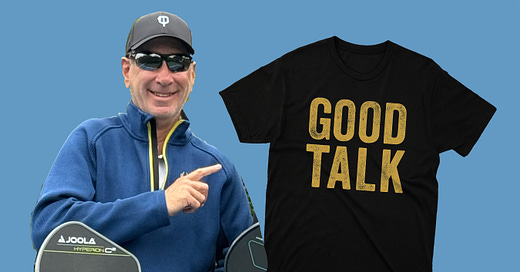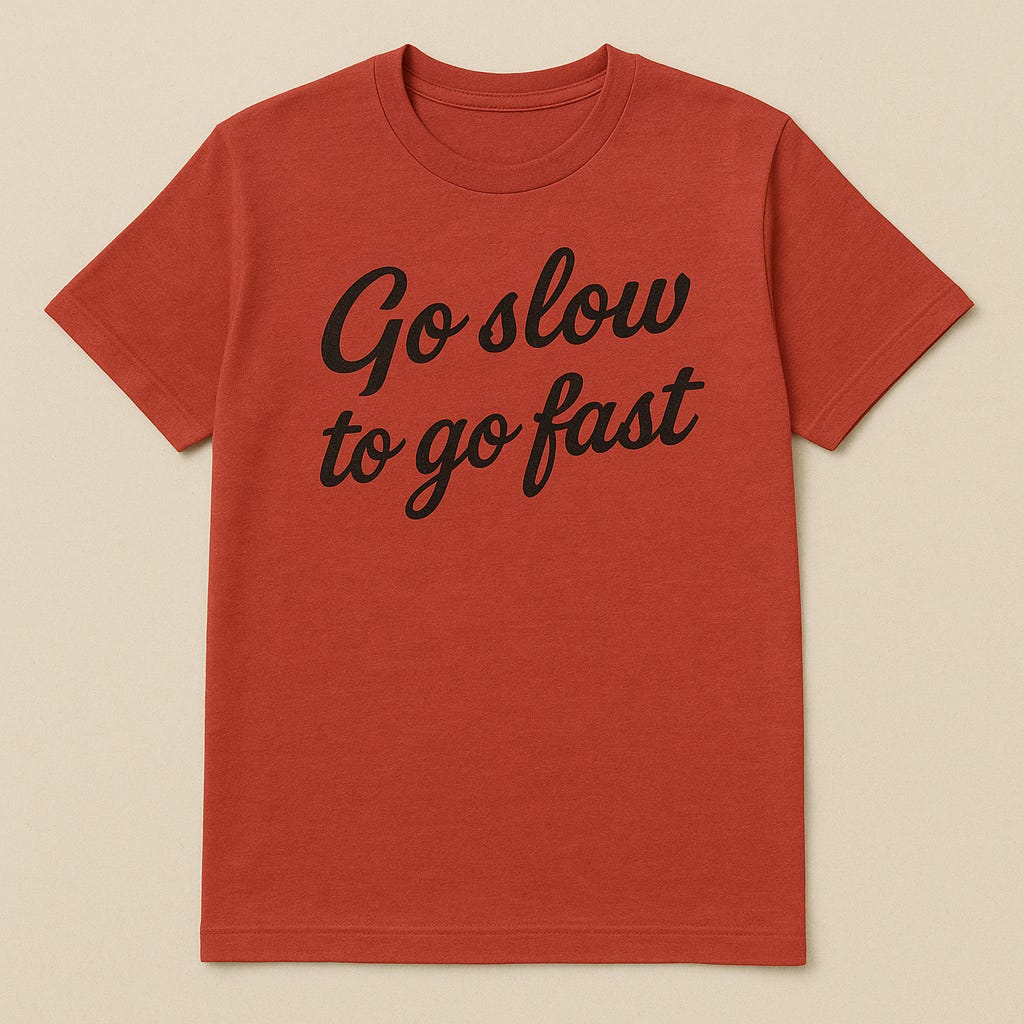"Good Talk" (And Other Phrases That Hijacked My Brain)
How we become carriers of wisdom bigger than ourselves and the responsibility that comes with it.
I love listening to people and hearing them repeat things that are like catchphrases. And I don't think they're aware of what they're saying. Really.
Our pickleball coach, Coach Richard Pastoria, will have us come up to the net and share some pithy trick, tip, insight, or whatever, sometimes just a quick story. And when he sends us back to the baseline, he says, "Good talk."
It's hilarious because we didn't say a thing.
In fact, when I walk into our living room and start talking to Kymberlee, then walk away, she'll say, "Good talk." And we both laugh.
But here's what I started wondering: if Coach Richard has his unconscious catchphrase, and if it's become a running joke in our house... what are mine? What am I saying that I don't even realize I'm saying?
The T-Shirt Test
That's when I remembered something I've been doing since I started podcasting in 2015. When a guest says something brilliant, I'll stop and say, "There's my t-shirt,” meaning they've said something I'd love to see on a t-shirt.
I even have a website, Oddly Useful Robots, where I can put sayings into a virtual t-shirt maker called TeeSayer and share it with whoever said it. And honestly? If there were a print-on-demand service that let me make just one shirt, I'd be in serious trouble. I'd have a compulsive habit of making t-shirts I'd never actually wear.
It's this belief I have that we inadvertently say really smart things and sometimes don't even realize it. And if I put it on a t-shirt, for some strange reason, it becomes more real.
So I applied my own test: which of my catchphrases would actually look good on a t-shirt?
Turns out, quite a few.
But as I started cataloging them, I realized something more interesting was happening. I wasn't just collecting sayings; I was inheriting them, borrowing them, and somehow making them my own.
And that raised a question that's been nagging at me ever since.
The Attribution Anxiety
Here's the thing: I've always been conscious about appropriating other people's sayings and giving credit where it's due.
Take this one: "There are only three things to remember to have an amazing life: someone to love, something to do, and something to look forward to."
I heard this in a book I was listening to while cooking in the kitchen. I immediately wrote it down. When I looked it up later, I found that it has been attributed to everyone from Tom Bodett to Kenny Rogers to Immanuel Kant. The idea has been around forever, passed from person to person, getting refined and reshaped each time.
I don't like it when people parrot other people's stuff without credit. But when it comes to these sayings that keep us going, what's the role of attribution? At what point does borrowed wisdom become communal property?
Because here's what I've noticed: some phrases choose us. They don't just bounce off; they burrow in and become part of our operating system.
The Recognition Moment
A few years ago, I was working with a client, explaining how I approach learning new things. I said something like, "I see someone do it, then I do it myself, then I teach it to someone else."
She stopped me and said, "That's SoDoTo, See One, Do One, Teach One. That's how they train doctors in medical school."
I had no idea I was following a formal methodology. But she was right.
A doctor sees a thumb suture in the ER
Then does the next stitching later that day
Then the next day, they show another resident how to suture a cut on an arm
I do this all the time, especially with AI. I'll see something from Ethan Mollick, try it myself, then teach it to clients. Several times a week.
I didn't create SoDoTo. But somehow, it had become my natural pattern without me even knowing it.
That's when I started wondering: how many other phrases and frameworks had chosen me? And what was my responsibility as someone who'd become a carrier?
The Ones That Became Mine
As I dug deeper, I found sayings that had become so much a part of me, I'd forgotten they started somewhere else. And a few that were genuinely mine or at least, mine now.
"That's One in a Row."
I don't remember the first time I said this to a coaching client who had just done something they'd never done before. I wasn't trying to be profound. I was celebrating. Pure celebration.
Because people are terrible at giving themselves permission to celebrate small wins. "That's one in a row" gives weight to the moment. It implies there's a row to be built. It says this matters enough to count.
Now, clients expect it. They joke about it. They repeat it. And they smile every time because it flips the pressure of "keep going forever" into the joy of "you did it once."
"If You Want to Park in Front, You Have to Drive in Front."
This one started literally in parking lots. Most people assume the front spots are taken. I drive straight there. More often than not, there's a spot waiting.
It became my metaphor for opportunity. If you don't believe something good is possible, you'll never risk going for it.
Opportunity doesn't wave you in. You drive up, check, and find it waiting.
"The World Belongs to Those Who Show Up."
I learned this at Wavefront when I'd call important meetings. The calendar would fill, but only three people would show up. At first, I was frustrated. Then I saw the gift. Those three would make the decisions. They'd shape direction.
Presence is power. Not potential power, actual power.
"Go Slow to Go Fast."
This one's different. It's not for others, it's for me. From Grandmaster Dave Wheaton at the dojo, but now I say it to myself at least five times a week.
Usually, while driving, I think I can make that risky turn. Or in the kitchen when I'm about to grab a hot pan without checking my grip.
Going slow isn't about being careful; it's about being present enough to move with precision
.
The Method Behind Everything
But there's one phrase that stands out from all the others. This one is mine. Well, sort of mine.
At Wavefront, we said it all the time: "See what you think." We were the visualization experts. Our software helped people see what they thought, scripts, visual effects, new products, and new ways to visualize data. Anything that was in their head, we could help them see.
It always stuck with me. And over time, it became my approach to everything:
Own the problem - Be clear about what you're trying to solve
Dive In and Discover - Write down everything you know and don't know
Cluster the Chaos - Sort your thoughts into buckets
Make a Map - Draw a timeline from now to your goal
Commit to the first step - Then take it
This is where "one in a row" came from. Because after all that mapping and planning, you still have to take that first step.
Maybe visualization and problem-solving are the same thing. Maybe every challenge is just something we need to see clearly first.
Why Some Stick and Others Don't
So why do certain sentences lodge in the brain while others bounce off? Why do some of us become carriers while others don't?
I think it comes down to this: the phrases that stick don't just sound true, they change what happens next.
"That's one in a row" doesn't just acknowledge achievement, it transforms it into celebration
"Go slow to go fast" doesn't just offer advice, it interrupts a pattern in real time
"SoDoTo" doesn't just describe learning, it gives you a framework to repeat it
The phrases that choose us are the ones that make us different after we hear them.
The Responsibility of Carrying Wisdom
Here's what I've come to understand: when a phrase chooses you, you become responsible for it, not just for using it, but for passing it on in a way that honors both its origin and its potential.
I give credit when I can. I say, "This is how they train doctors," when I talk about SoDoTo. I acknowledge Grandmaster Wheaton when I share "go slow to go fast."
But sometimes attribution gets messy. Sometimes wisdom becomes so universal that trying to track its origin is like trying to find the first person who said "hello."
What matters more is this: are you passing it on in a way that serves? Are you adding your own layer of understanding? Are you helping it evolve?
Because that's how wisdom travels. From Coach Richard's unconscious "good talk" to Kymberlee's playful echo to my conscious collection of phrases that guide my life.
We don't just carry these sayings. We become part of their story.
The Traveling Truth
These phrases didn't come from books or big speeches. They came from living. From listening. From being taught by people I respected, even if I didn't know how much at the time.
Some were inherited. Some were borrowed. Some became mine through repetition and refinement.
All of them became philosophies.
Now, they guide how I coach, teach, and make choices. And when I hear them come out of someone else's mouth, a client celebrating with "That's one in a row!" or someone realizing they need to "drive in front to park in front", I know they've landed again.
That's how wisdom works: it doesn't stay where you left it. It moves through people, gets tested in new situations, and proves itself all over again. And sometimes, if we're lucky, we get to be part of that journey.






